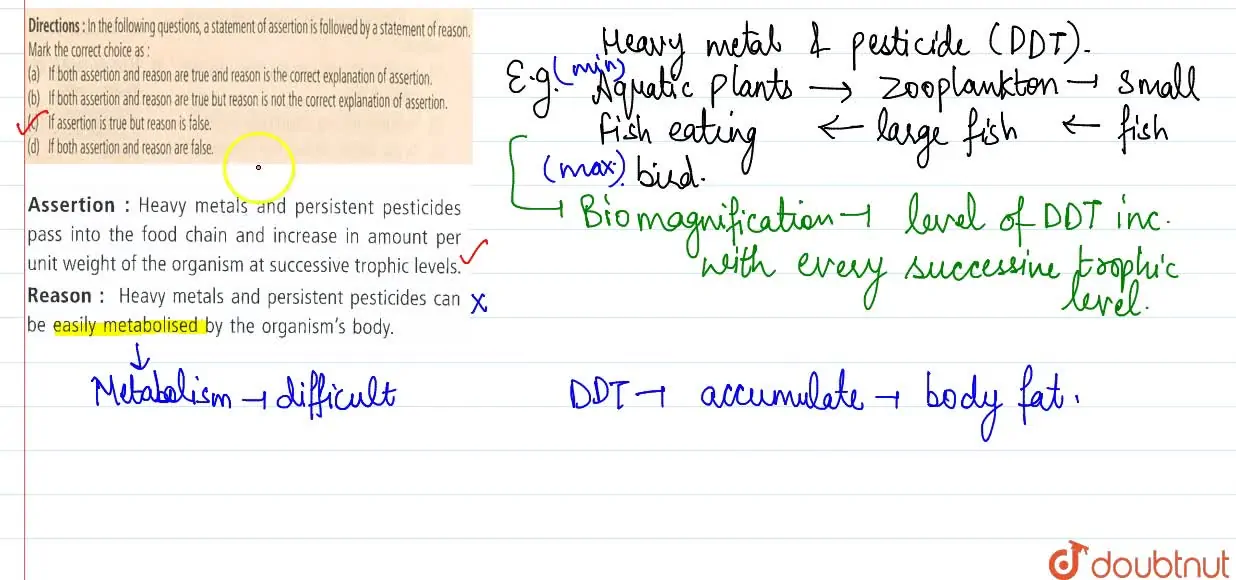Assertion : Heavy metals and persistent pesistent pesticides pass into the food chain and increase in amount per unit weight of the organism at successive trophic levels.
Reason : Heavy metals and persistent pesticides can be easily metabolised by the organism's body.
The correct Answer is:C
Heavy metals and persisten pesticides (e.g., organochlorine or chlorinated hydrocarbons like DDT) pass into food chain and increase in amount per unit weight of organisms with the rise in trophic level due to their accumulation in fat. The phenomenon is called biomagnification/bioconcentration/biological amplification. In other words, biomagnification refers to increase in concentration of the toxicant at successive trophic levels. This happens because a toxic substance accumulated by an organism cannot be metabloised or excreted, and is thus passed on to the next higher trophic level. This phenomenon is well-known for mercury and DDT. High concentration of DDT disturb calcium metabloism in birds, which causes thinning of egge shell and their premature breaking, eventually causing decline in bird population. These chlorinated hydrocarbons affect CNS, cause softening of brain, cerebral haemorrhage, liver cirrhosis, hypertensin and also affect an organism's reproductive system.
Related Playlists
Similar Questions
Presistent pesticides such as DDT pass into food chain and increase in amount per unit weight of organism due to their accumulation in fat. This phenomenon is called
View SolutionAccumulation of non-biodegradable pesticides in the food chain in increasing amount at each higher trophic level is known as
View SolutionAccumulation of non-biodegradable pesticides in the food chain in increasing amount at each higher trophic level is known as
View SolutionAccumulation of non-biodegradable pesticides in the food chain in increasing amount at each higher trophic level is known as :
View SolutionAssertion (A) : Food chains can be as long as any number of trophic levels.
Reason (R) : There are number of organisms interdependent an each other.View SolutionIncreasing accumulation of heavy metal in higher trophic levels of a food chain is
View SolutionAssertion: The loss of biologically useful energy as heat with every energy transfer in a food chain is a consequence of the second law of thermodynamics.
Reason: Energy does not remain trapped permanetly in any organism. It is either passed on to higher trophic level or becomes available to detritivores and decomposers after the organism dies.View SolutionVOICE' is an important consumer organisation. It organised workshops in the months of December in Delhi/NCR for consumers. The theme was 'Organic Food-From Farm to Plate', to spread awareness on the importance of organic farming and to encourage consumers to switch from conventional food, that contains chemicals and pesticides to organic food. Expert speakersfrom farmers' community explained the harmful effects of usage of pesticides in farming and the importance of organic food. People were informed that the organisation regularly tests samples to detect adulteration like presence of heavy metals or pesticides. The results of the tests are published in their monthly magazine 'Consumer Voice' to make people aware of quality of different products. It also provides aid and legal advice to the consumers in seeking a remedy.
State the functions performed by the Consumer Voice for the protection and promotion of consumer interest by quoting lines from the above para.View SolutionA food chain consists of fish, larvae , phytoplanktons and birds. The level of pesticides in water in which the fish, larvae and phytoplanktons live is quite high.
(a) In which organisms the pesticides enter from the polluted water ? What is the level of organisms known as ?
(b) Which organism will have the maximum amount of pesticides accumulated through the food chain ? What is this process known as ?
(c) Write the food chain comprising all the organisms mentioned above.
(d) Which other organism you could write in place of bird in the above food chain ?View SolutionAssertion (A) : In a food chain members of successive higher levels are fewer in number.
Reason (R ): Number of organisms at any trophic level depends upon the availability of organisms which serve as food at the lower level.View Solution


